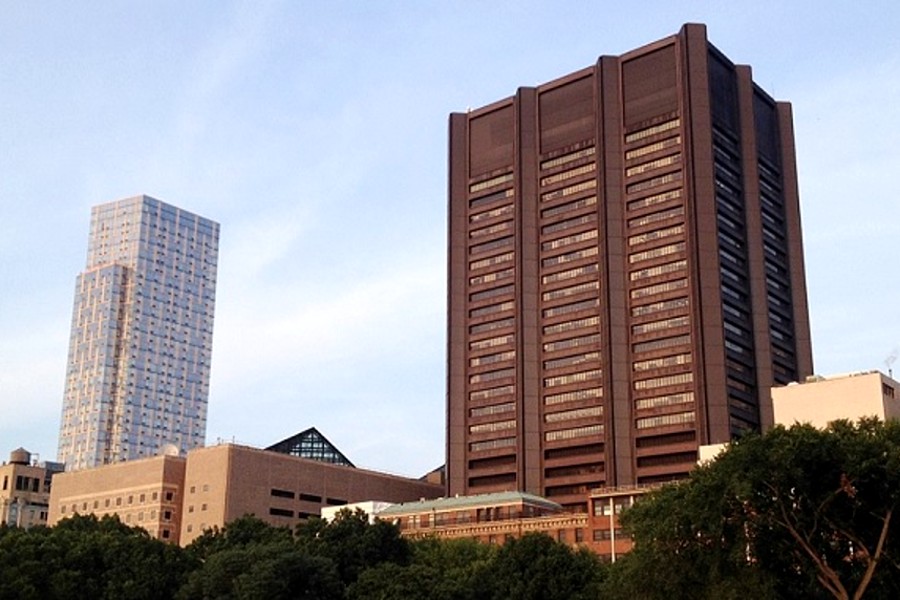
The Icahn School of Medicine at Mount Sinai announced today the appointment of three new Laureates as part of its Biomedical Laureates Program.
Furthering its institutional commitment to broadening diversity and mentorship opportunities.
One of the new appointees, Aderonke (Ronke) Akinkugbe, BDS, MPH, PhD, joined the Department of Environmental Medicine and Public Health as Associate Professor.
Previously at Virginia Commonwealth University, Dr. Akinkugbe is a public health dentist and chronic disease epidemiologist who uses causal inference methods to draw conclusions about psychosocial and environmental determinants of poor oral and systemic health outcomes and health care utilization patterns across the lifespan, including the role of prenatal exposures in poor oral health outcomes.
At Mount Sinai, she will be exploring the exposomes—everything we are exposed to during our lifetime—as modifiable determinants of poor oral health and, by extension, their role in systemic health conditions to improve population oral health.
She has received several prestigious awards for her work, which has been cited more than 700 times.
She sits on the board of several journals, including the Journal of the American Dental Association, and has provided her expertise on several National Institutes of Health grant review panels.
“Being named a Mount Sinai Biomedical Laureate is a real honor for me because I am able to access the needed infrastructural support and mentoring to conduct research that improves population oral health. More important, the program speaks to Mount Sinai’s commitment to diversity, inclusion, and equity. Seeing them deliver on that commitment and being part of the effort to increase minoritized faculty representation is exciting,” said Dr. Akinkugbe.
Another appointee, Igor Bado, PhD, joined The Tisch Cancer Institute at Icahn Mount Sinai as Assistant Professor.
Currently a faculty member at Baylor College of Medicine, Dr. Bado is researching cancer and the mechanisms that contribute to metastatic progression of the disease.
He is particularly interested in the role of epigenetic plasticity—how genes change based on adaptations to the environment—in that progression.
Dr. Bado helped identify estrogen receptor beta (ERβ) as a biomarker for predicting the efficacy of hormonal therapy in 10 to 15 percent of triple-negative breast cancer—cancer cells that do not have any of the known markers typically associated with breast cancer.
As a Mount Sinai Biomedical Laureate, Dr. Bado will expand the scope of his research to look at how different tissues, such as the liver, lung, and brain, influence the evolution and aggressiveness of cancer.
“It is exciting to join such a highly regarded institution and to be able to translate my findings into the clinic for the benefit of patients. Mount Sinai’s large and diverse patient population will facilitate that effort and enable me to look at how other diseases are associated with cancer. It is also exciting to be part of a program that is actively increasing the number of faculty members and researchers from different backgrounds. The more diverse we are as a field, the more ideas we can explore to address challenges, such as cancer, in ways that are reflective of and meet the needs of all patients,” said Dr. Bado.
The third Biomedical Laureate, Donald Apakama, MD, is joining the Department of Emergency Medicine and the Department of Artificial Intelligence and Human Health as Instructor. Dr. Apakama began his emergency medicine residency at Mount Sinai in 2016 after completing medical school at the Albert Einstein College of Medicine.
As a resident, he served as Chair of the Informatics Committee for the Emergency Medicine Residents’ Association and as its liaison to the American College of Emergency Physicians.
In his final year of residency, Dr. Apakama was selected to be Chief Resident, and began publishing on the data sciences.
Upon graduating from residency, Dr. Apakama was accepted into the Mount Sinai Clinician Scientist Training Program (T32) in Emergency Care Research, which enabled him to simultaneously obtain formal research training at Mount Sinai and a master’s degree in Bioinformatics from Oregon Health and Science University.
Dr. Apakama’s research focuses on the potential of using clinical informatics—the study of how data and technology can be used to enhance the quality of health care—to quickly transform high volumes of patient data into actionable tools that reduce health disparities and improve outcomes.
He is conducting a study to explore whether it is possible to train a computer algorithm to flag patients with unmet social determinants of health who also have a genetic mutation (TTRV122L) that is associated with a higher risk of heart failure and then follow them to see if they have worse outcomes.
“It is humbling to be named a Mount Sinai Biomedical Laureate and to have access to its very large dataset, which is really important in my field of research. Through its biobank, Mount Sinai has tens of thousands of genetic samples, all connected to electronic patient records, and that opens the door to explore precision medicine approaches to care that have the potential to be more effective and highly impactful for patients,” said Dr. Apakama.
Launched in September 2020, the Biomedical Laureates Program is one of several initiatives that Icahn Mount Sinai has undertaken to advance inclusivity and diversity in biomedical science and in its faculty pipeline and mentorship opportunities.
They include a five-year, $16 million grant from the National Institutes of Health (one of only seven awarded in the nation) to foster inclusive excellence in biomedical sciences using evidence-based approaches.
Through the grant, Icahn Mount Sinai aims to recruit and hire 12 faculty members from underrepresented groups across four research areas and institutes: The Friedman Brain Institute, the Institute for Health Equity Research, The Tisch Cancer Institute, and the Global Health and Emerging Pathogens Institute.
“Empirical research has shown that when you bring a diverse group of people together to tackle a problem, they do so in a more comprehensive and creative manner, resulting in solutions that have wide-ranging benefits. That is particularly true in the realm of clinical research,” said Eric J. Nestler, MD, PhD, Nash Family Professor of Neuroscience, Director of The Friedman Brain Institute, and Dean for Academic Affairs of Icahn Mount Sinai, and Chief Scientific Officer of the Mount Sinai Health System. Dr. Nestler was an early champion of the Biomedical Laureates program.
“Through our Biomedical Laureates Program, Mount Sinai is doing that. In our first year, we recruited four Laureates who have been spectacular additions to our institution and who have helped change the face of Mount Sinai in profound ways. The three laureates we have recruited so far this year are building on that success through their diverse expertise in cancer, emergency medicine, and environmental health. We believe their work, and this program, will enable us to optimize the diagnosis and treatment of illness while effectively addressing health disparities in our society. The result will have a significant positive effect across the breadth of our institution and the patient populations we serve.”
The Mount Sinai Health System
Mount Sinai Health System is one of the largest academic medical systems in the New York metro area, with more than 43,000 employees working across eight hospitals, over 400 outpatient practices, nearly 300 labs, a school of nursing, and a leading school of medicine and graduate education.
Mount Sinai advances health for all people, everywhere, by taking on the most complex health care challenges of our time — discovering and applying new scientific learning and knowledge; developing safer, more effective treatments; educating the next generation of medical leaders and innovators; and supporting local communities by delivering high-quality care to all who need it.
Through the integration of its hospitals, labs, and schools, Mount Sinai offers comprehensive health care solutions from birth through geriatrics, leveraging innovative approaches such as artificial intelligence and informatics while keeping patients’ medical and emotional needs at the center of all treatment.
The Health System includes approximately 7,300 primary and specialty care physicians; 13 joint-venture outpatient surgery centers throughout the five boroughs of New York City, Westchester, Long Island, and Florida; and more than 30 affiliated community health centers.
We are consistently ranked by U.S. News & World Report‘s Best Hospitals, receiving high “Honor Roll” status, and are highly ranked: No. 1 in Geriatrics and top 20 in Cardiology/Heart Surgery, Diabetes/Endocrinology, Gastroenterology/GI Surgery, Neurology/Neurosurgery, Orthopedics, Pulmonology/Lung Surgery, Rehabilitation, and Urology.
New York Eye and Ear Infirmary of Mount Sinai is ranked No. 12 in Ophthalmology. U.S. News & World Report’s “Best Children’s Hospitals” ranks Mount Sinai Kravis Children’s Hospital among the country’s best in several pediatric specialties.
The Icahn School of Medicine at Mount Sinai is one of three medical schools that have earned distinction by multiple indicators: It is consistently ranked in the top 20 by U.S. News & World Report’s “Best Medical Schools,” aligned with a U.S. News & World Report “Honor Roll” Hospital, and top 20 in the nation for National Institutes of Health funding and top 5 in the nation for numerous basic and clinical research areas.
Newsweek’s “The World’s Best Smart Hospitals” ranks The Mount Sinai Hospital as No. 1 in New York and in the top five globally, and Mount Sinai Morningside in the top 20 globally.
For more information, visit https://www.mountsinai.org or find Mount Sinai on Facebook, Twitter, and YouTube.
Become a Harlem Insider!
By submitting this form, you are consenting to receive marketing emails from: . You can revoke your consent to receive emails at any time by using the SafeUnsubscribe® link, found at the bottom of every email. Emails are serviced by Constant Contact








